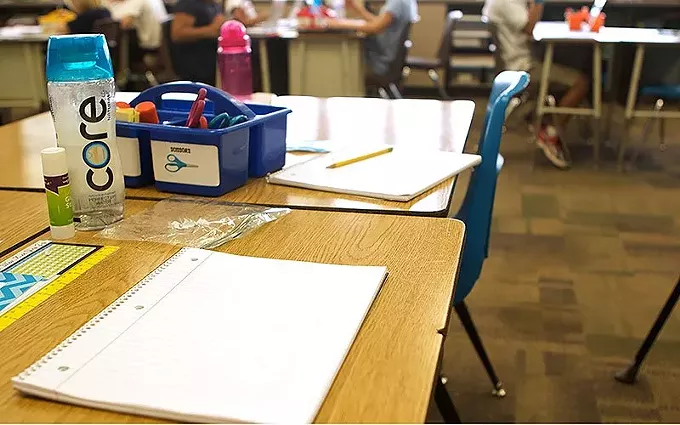Wednesday, February 16, 2022
House Passes Measure to Avoid School Funding Cuts, but Senate Appears 1 GOP Vote Short
The push to temporarily raise the state’s spending limit for K-12 schools and avoid nearly $1.2 billion in cuts that could close classrooms passed easily in the state House of Representatives but stalled out in the Senate, where it may only be one Republican shy of the 20 votes needed to pass it.
With the Senate’s 14 Democrats unanimously supporting the measure, legislative leaders need only five Republicans to get to the two-thirds supermajority required to raise the aggregate expenditure limit, which is necessary to allow schools to spend the money that lawmakers budgeted for K-12 education last year.
Five Republican senators — Nancy Barto, Paul Boyer, Tyler Pace, T.J. Shope and Senate President Karen Fann, who sponsored the resolution to raise the cap — confirmed to the Arizona Mirror that they’re supporting the measure.
That means there are 19 votes. But the pivotal 20th vote proved elusive on Tuesday. Fann delayed the start of the Senate’s floor session by more than a half hour while she tried to round up the last vote. She wouldn’t confirm how many votes she already has, but says she’s close.
The problem is that many Republican senators won’t vote for the resolution until they know that it won’t open the door for Proposition 208, a voter-approved income tax hike on wealthier Arizonans. The Arizona Supreme Court ruled last year that the tax hike is illegal if the new revenue would exceed the aggregate expenditure limit, and sent the case back to a Maricopa County Superior Court judge to determine. So far, Judge John Hannah has taken his time.
Last week, Hannah told legislative leaders that he’ll issue his ruling on his own timeline. The Arizona Constitution sets a March 1 deadline for lawmakers to raise the expenditure cap before districts will have to start making budget cuts. Superintendent of Public Instruction Kathy Hoffman says that would represent a cumulative 16% cut for school districts.
Because the school year would be roughly three-quarters over when the cuts are scheduled to go into effect, many school districts have said the impact would be massive — and could force teacher layoffs and school shut-downs.
“Clearly, (Hannah’s) comments last week were less than respectful for the process. He basically said, ‘I’ve got other things on my agenda and I’ve got 60 days to do it, so I’ll get to it when I get to it,’” Fann, R-Prescott, told the Mirror. “Unfortunately, because the judge is holding up the ruling, I’ve got some members who were not comfortable voting on it yet until they see the ruling from him.”
Republican holdouts, for now at least
That’s the position Sen. J.D. Mesnard, R-Chandler, took. Mesnard is willing to vote to raise the spending cap, but not until the judge rules on the Prop. 208 issue. Even though the House and Senate resolutions only authorize schools to exceed the cap by the $1,154,028,997 the legislature budgeted for them last year, Mesnard said the judge’s delay makes him wonder if Hannah is waiting for the legislature to vote. If lawmakers lift the cap, he worries that the judge will come back and say the situation has changed in some way that will allow Prop. 208 to go into effect.
“I’ve gone from frustrated to furious that this is the situation in front of us that was entirely avoidable. And I don’t understand why it’s taking so long,” he said.
It’s unclear when the Senate might vote on the resolution to lift the cap. Fann said Republican lawmakers have filed a petition for special action with the Arizona Supreme Court. They hope to convince the justices to either order Hannah to act quickly — he has until March 10 to rule in the case — or to take over the case themselves.
Several Republican senators declined to state their positions on the resolution.
“I’m going to vote when it’s up on the board,” Sen. Sine Kerr, R-Liberty, said.
Sen. David Livingston, R-Peoria, said he was a no on Tuesday, but that could change in the days to come. He wouldn’t say if his concern was specifically linked to Prop. 208.
“Just everything. It’s not an easy discussion. This is not a slam-dunk decision. So, I want more information,” he said.
Sen. Vince Leach, R-Tucson, said he’s waiting for one piece of information to come back before he takes a position, though he declined to say exactly what that was.
“I am not hopeful that I’m going to get the information. And if that information doesn’t come back in the affirmative, I will be in the negative,” Leach said.
Democratic Sen. Juan Mendez was absent from the Senate on Tuesday while he was home with his newborn child, which could have potentially left leadership scrambling for another Republican vote. But Fann said Mendez had permission to vote from his legislative office under the Senate’s COVID-19 protocols, and that her understanding was that he came to the Capitol in case his vote was needed.
The legal vs. the practical
While the Arizona Constitution sets a March 1 deadline, Mesnard said the more important deadline is actually April 1. That’s when state law requires school districts to submit their revised budgets. Until then, districts won’t actually have to make the cuts.
That’s technically true, but it doesn’t necessarily mean districts won’t face any problems if the legislature misses the March 1 deadline but acts before April 1, said Chris Kotterman, a lobbyist for the Arizona School Boards Association.
“That’s the legal deadline versus the practical deadline,” Kotterman said.
If the legislature doesn’t lift the cap by March 1, Kotterman said districts will start planning for likely cuts. That could include providing teachers and other certified staff with notices of pending salary cuts. It could even include phasing in cuts ahead of time to lessen the burden of making them after April 1. Districts will likely lose faith that the legislature will lift the cap and begin taking action accordingly. Teachers and other staff might not wait around and could quit earlier if they have the option to get other jobs, he said.
“You start running into timing issues where, if you dilly-dally too long, school districts are in the process of making budget reductions while you’re trying to figure out whether or not you’re going to let them spend the money,” Kotterman said. “I think there’s a potential for actual damage even before April 1.”
Smooth sailing in the House
Things went far more smoothly in the House on Tuesday, where the resolution passed 45-14. Seventeen Republicans voted to lift the cap and 14 voted against it.
Rep. Jennifer Pawlik, a Chandler Democrat who sponsored a resolution to raise the cap earlier in the session, said she was pleased to cast a vote that would ensure schools can begin the fourth quarter of their academic years with the full funding the legislature allocated to them in 2021. And she questioned why school districts were left waiting so long.
“The override is a temporary fix that will allow schools to spend the money that has already been allocated. They have not done anything wrong, and they certainly have not overspent their budgets,” Pawlik said. “It’s been frustrating to watch the mountain anxiety of our educators as they’ve waited for the action of this body, knowing that in the past when an override was needed it was handled quickly and without fanfare.”
House Speaker Rusty Bowers, R-Mesa, didn’t appear to share the concerns of many Senate Republicans that raising the cap would affect the litigation over Prop. 208.
“No one ever said the schools were doing something wrong. We simply said we wanted to make sure there was no linkage between this issue and other issues,” he said.
This article was originally on the Arizona Mirror, a nonprofit news organization.












